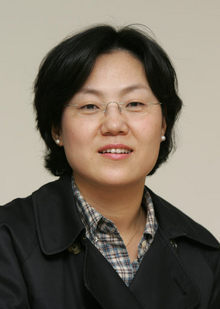Posted on : Jan.23,2007 16:53 KST
Gwon Su-hyeon, Korea Womenlink
Recently I saw a report on the evening news that mixed-race children of foreign women living in Korea are having problems in school because their mothers don't know enough Korean to be able to help them with their studies. The gist of the story was that low scholastic achievement by "Kosians" - a combination of "Korean" and "Asian," i.e., the mothers are from other Asian countries - will inevitably lead to poverty, so these foreign wives are in urgent need of the kind of training that would help them adjust to Korean language and society. There does exist an initial need to teach migrant women Korean language and culture, but over the long run this isn't going to be enough to keep their children from poverty.
Helping these Kosian children become more like wholly ethnic Koreans in terms of language and education is not going to change the color of their skin, so it's not going to eradicate the estrangement they face in Korean society. In the end, the key problem is the discriminatory way Koreans view appearances. No matter how multiracial children may try to adjust to Korean society, they will be excluded from mainstream Korean society and end up in poverty if there is no change in the way Koreans view them. That is sad for them, too, but it is invariably a serious problem for Korean society, as well. Contempt, alienation, and poverty lead to crime, and these individuals will gradually become a group marginalized in society.
As Korea thinks about her future, she has a lot to learn from the riots that broke out in France in the summer of 2005. Even if they get a quality education, migrants in France lose out in the competition over jobs because the color of their skin is different or because their parents or grandparents are North African or Arabic. They have to live with insults and teasing, and it's emotionally devastating to always be seen as a criminal, or to be treated like you are not even human. The fundamental reason this demographic has been unable to get out of poverty is because of the racism in mainstream French society. Once you think of it that way, who can guarantee that the riots that happened there two years ago are not going to be repeated in Korea in the near future?
In
Ten Thousand Sorrows: The Extraordinary Journey of a Korean War Orphan, the biracial author Elizabeth Kim, who was adopted in the United States after being born in Korea, makes a few requests of U.S. society regarding the way it treats its foreign adoptees. She suggests that instead of forcing them to completely adapt to mainstream white U.S. society, adoptive parents should try to understand the cultural shock their children are going through, and that there isn't anything wrong with them that requires that they change.
Her exotic appearance meant she was teased everywhere. In Korea, her Western appearance made people treat her like an animal, even throw stones at her. In the U.S., she was looked down on because of her Asian features. The strength she had to live through the contempt and discrimination that came with being an outsider in both places she received from her frank and assertive birth mother.
The single biggest resource Kosians need as they live in Korean society is an environment that respects them for who they are, because it is always difficult for children to have healthy egos when they grow up under parents who lack pride in their culture and appearance. This why there needs to be policy designed for migrant women and Kosian children, but there is no less of a need for a change in how "native" Koreans think about them. Removing the glass wall of racial discrimination is the only way ensure that Korea as a nation has a future.
Please direct questions or comments to [englishhani@hani.co.kr]






